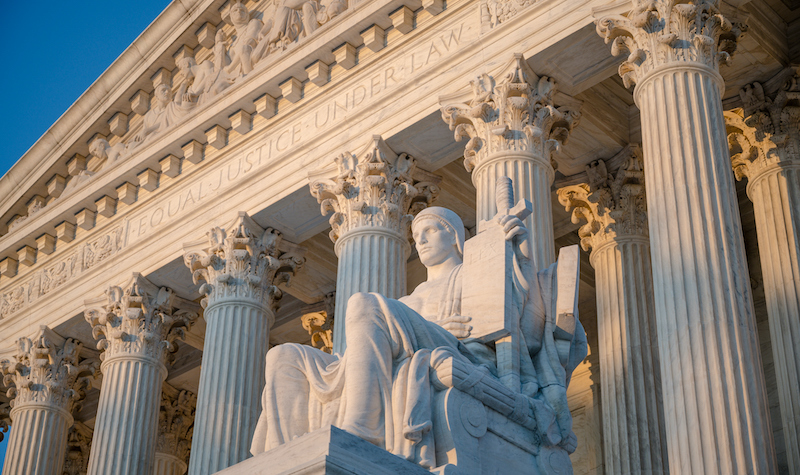
The Supreme Court will decide whether federal courts are required to presume the credibility of noncitizens.
Every year, thousands of noncitizens find themselves before an immigration judge seeking relief from deportation. Now their fate rests largely in the hands of the U.S. Supreme Court, which is set to decide what happens when an immigration judge fails to make a critical decision about their credibility.
Under U.S. immigration law, two common forms of relief from deportation include asylum and withholding of removal. To obtain either one, noncitizens must prove their eligibility, usually before an immigration judge. Although noncitizens can introduce evidence to help make their case for relief, their testimony on its own may be sufficient to demonstrate their eligibility—but only if an immigration judge determines that their testimony is credible. Noncitizens are not entitled to a “presumption of credibility”—rather, they must affirmatively demonstrate their credibility to the satisfaction of an immigration judge.
But the Immigration and Nationality Act creates a critical exception to this rule. If an immigration judge fails to make an explicit “adverse credibility determination” during a deportation hearing, noncitizens shall “have a rebuttable presumption of credibility” if they appeal the immigration judge’s decision. This means that if an immigration judge does not clearly make a credibility finding, the noncitizen’s testimony is presumed to be true when the noncitizen’s case is on appeal.
After an immigration judge makes an unfavorable decision, noncitizens can first seek review before the Board of Immigration Appeals (BIA), an administrative body within the U.S. Department of Justice that adjudicates appeals from the immigration courts. If the BIA still makes a decision unfavorable to a noncitizen, the noncitizen can then seek a second level of review in federal court.
In two consolidated cases now pending before the Supreme Court, an immigration judge failed to make explicit a negative credibility determination, which meant that the BIA was supposed to presume the noncitizen’s testimony was credible. But the BIA also failed to make a credibility finding. Does this mean that the federal court reviewing the BIA decision must presume the noncitizen’s testimony was credible?
In both cases, noncitizens are arguing before the Supreme Court that a federal court is bound by the Immigration and Nationality Act’s presumption of credibility. Whenever both the immigration judge and the BIA fail to make an explicit credibility finding, the federal court must treat noncitizens’ testimony as credible.
The government, however, asserts that even if the immigration judge and the BIA fail to make an explicit credibility finding, a reviewing court is not beholden to a presumption of credibility. According to the government, the court may review the testimony and make its own credibility determination.
How the Supreme Court rules may affect the thousands of noncitizens who seek relief from deportation each year, especially those who seek to appeal deportation orders.
In one of the cases before the Court, for example, an immigration judge denied noncitizen Ming Dai the relief he sought and ordered his removal to China, where he believed he would face severe persecution. The immigration judge concluded that Dai “failed to meet his burden” to prove eligibility for relief, based on his “lack of forthrightness” and gaps in his testimony. On appeal, the BIA “adopted and affirmed” the immigration judge’s decision, highlighting that Dai had not been truthful in his testimony, which was “detrimental to his claim.”
In a final effort to avoid deportation, Dai appealed his case to a federal court, which concluded that, despite expressing skepticism about Dai’s credibility, neither the immigration judge nor the BIA had made an explicit credibility finding. The court held that it must presume Dai’s testimony to be credible. Applying that presumption, the court granted the noncitizen relief because he “testified to sufficient facts to demonstrate his eligibility for asylum.”
If the court had not been bound by this presumption, it could have concluded, as the immigration judge and BIA did, that Dai’s testimony was not sufficiently credible—and, accordingly, it could have denied his appeal and ordered his deportation. But because the court of appeals treated the presumption of credibility as binding, Dai, who was once on the verge of deportation, is now on a path to citizenship.
The government warns that, if the Supreme Court also treats the presumption of credibility as binding, it will overburden immigration judges, who are already facing significant backlogs. As the government explains, immigration judges avoid making explicit blanket credibility determinations because they often confront a mix of both credible and non-credible testimony. Binding courts of appeals to a presumption of credibility may require immigration judges to make findings that “specifically identify each and every piece of testimony” that they determine is not truthful or else risk that a reviewing court will presume all the testimony was true.
The noncitizens in both cases downplay the potential pitfalls of ruling in their favor, arguing that whether a court of appeals will eventually be bound to presume credible a noncitizen’s testimony “has no appreciable impact on the incentives for immigration judges to issue clear credibility findings.” As they see it, the vast majority of immigration judges already make explicit credibility findings, to which reviewing courts routinely defer. A presumption in favor of credibility would require reversal in only a “tiny fraction” of cases.
Regardless of how many cases would be directly affected, upholding the presumption of credibility would still likely have a significant impact. Indeed, the strong presumption may help counterbalance the implicit biases involved in credibility determinations in the first place.



